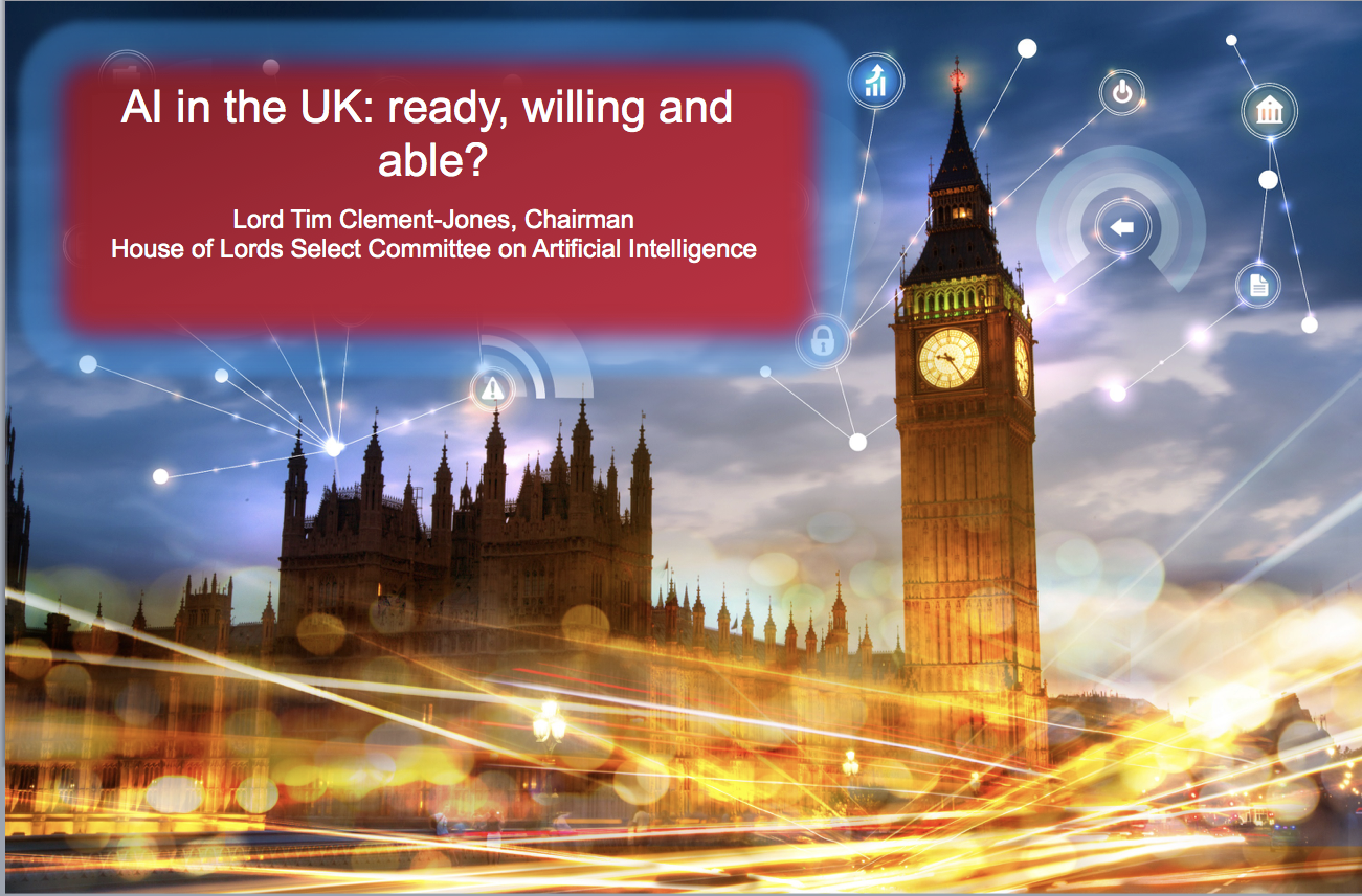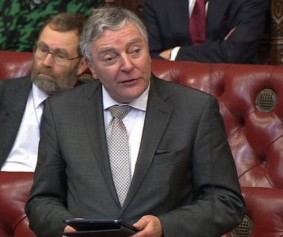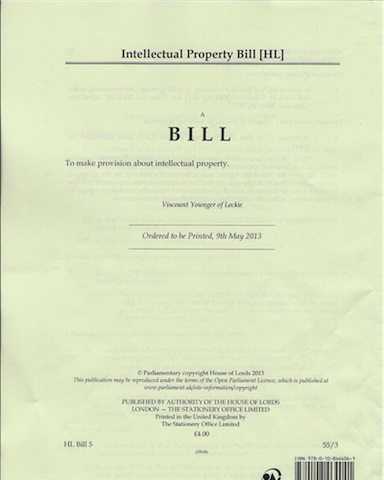Lord C-J launches Select Committee report on AI :"We Need an Ethical Framework"
Barely a day goes by without a piece in the media on a new aspect of AI or Robotics, including in today's Gulf Today I see. Some pessimistic others optimistic.Read more
Lord C-J calls for Action on Creative Skills
On the 28th January 2016 the Lords held a debate on Adult Education and the Skills Needed in the UK Economy. I called for action on skills in the Creative and Tech Industries.
http://www.publications.parliament.uk/pa/ld201516/ldhansrd/text/160128-0002.htm#16012842000917
- The challenge is that the vast majority of those businesses are small. Freelancing, too, constitutes 30% of the sector overall. There is a shortage not only of digital and software skills but craft and technical skills as well. In the tech sector, it is clear that we need 1 million tech jobs to be filled by 2020 to keep up with demand. There are also concerns about the quality of business skills in the creative sector, too.
- There are key questions about how the new apprenticeship levy will operate. . Will contributions from the creative industries be invested for the benefit of those industries? Will government investment continue alongside the levy? Will there be transparency in how contributions are invested? Will there be a joined-up, UK-wide approach in line with an industrial strategy for the creative industries? Will businesses be able to set some of their internal costs incurred in developing standards and administration against the levy through an allowable expense system?
- Achieving diversity is also a major challenge for the industry. Access to career pathways is obscure for those without connections. Unpaid internships are all too common. Interns can be useful, but they must be paid. Overall in the creative media, women, BAME people and the disabled are badly underrepresented. We need to attract, develop and nurture their skills to the maximum to identify and develop them faster. Mentoring, as NESTA has identified, is crucial
- We particularly need to take action to encourage more women into the tech industry, where women hold only 17% of the jobs. We must do more at the entry level; the process must start at school. In the creative sector, PSBs and the independent sector need to show leadership in efforts to increase diversity and social mobility.
- I welcome changes to the national curriculum so that it now includes coding and computer science but is disappointing that the Government seem so intent on a STEM rather than a STEAM agenda in our schools. The truth is that we need students going into the creative industries to be multidisciplinary
- There are many other issues on skills in the creative industries: visas for international entrants where skills are at a shortage; the importance of clusters; the relationship between universities; and in particular the AHRC knowledge exchange hubs in London and the nations and regions, such as the Creative Exchange and Creativeworks. What support are the Government giving to those hubs? What action are they taking to ensure that the two skills councils work ever closer together and merge into a powerful and effective body to make sure that we plan and make the right strategies for the creative industries.
Lord C-J debates the future of the BBC
Immediately before the publication of the Green Paper (BBC Charter Review Public Consultation) the House of Lords briefly debated the issues raised by the Chancellor's Budget decisions on the licence fee and the implications of leaks from the DCMS about the future of the BBC. This is what I said.
We have just witnessed a smash-and-grab raid. As five years ago, the Chancellor has treated the licence fee as a piggy bank. The director-general has had no alternative but to look cheerful about it, and all the while the Murdoch press gleefully gets government exclusives. I share the disappointment expressed by Rona Fairhead in her letter to the Chancellor last week about there having been no public debate at all about the licence fee. I think the CMS Secretary’s former colleagues on the Select Committee will be astonished, too.
Despite this, there are still major uncertainties. A Perry report recommendation to decriminalise could have an impact of £200 million. The CPI settlement now also appears conditional. We now at least have a debate going forward about the scope of activity of the BBC and the appropriate form of governance for the BBC, but the Secretary of State for CMS and the Chancellor seem to be in disagreement about whether the BBC should continue with popular programming. There is much talk of the BBC’s online presence but, as the example of Channel 4 shows, younger audiences are increasingly migrating to the internet, catch-up and streaming for television consumption.
There are issues to be discussed. In particular whether the BBC should or could move to a publisher broadcaster model. On the trust, my colleagues and I have never felt that the current structure properly resolves the issues of responsibility for the regulation, governance and management of the BBC. Like the CMS Select Committee, I would favour handing responsibility for regulation, including service licences, to Ofcom, as well as the existing responsibility for the public value test. We must have an open debate, and I ask the Minister: is the Green Paper on track for this week?
It is good that the BBC is mustering its supporters despite the sniping of the Murdoch Press and no doubt we will be intensively debating the issues in the months to come.
I also took part in the subsequent debate on the Question asked by Lib Dem colleague Baroness Grender focusing in particular on the Advisory Panel appointed by John Whittingdale the Culture Secretary which
- will meet frequently and contribute significantly to the Government’s charter review
- yet it has no terms of reference,
- will not take its evidence in public,
- and is not subject to appointment by reference to the Nolan principles.
As I said it is no surprise that even Tory peers described them as “assistant gravediggers” (Lord Patton) —and "they clank with special interests" (Lord Fowler)
http://www.publications.parliament.uk/pa/ld201516/ldhansrd/text/150917-0001.htm#15091736000665
The Future of the BBC was also debated by the Liberal Democrats at our Conference in Bournemouth and we will all be keeping a close eye on the review as it unfolds.
Government Rides to Rescue of Levy
With excellent timing in the Year of the Horse and just before the opening of the Cheltenham Festival, following pressure mainly from Coalition parties (Viscount Astor, Lord Mancroft, myself and others) and the Crossbenches (Viscount Falkland) the Government announced on Report Stage in the House of Lords that they would be inserting a new clause in the Gambling (Licensing and Advertising) Bill at Third Reading to enable the Horserace Betting Levy to be extended to include offshore bookmakers who do not currently pay the Levy. This has now taken place.
With the value of the Levy having fallen drastically in recent years (from £106m in 2003/4 to £66.7 m in 2012/13) this is very good news for horse racing which is this country's second most popular sport, with 5.6 attendees at events in 2012, and which makes a substantial contribution to the UK economy.
Peers Debate the WWW on its 25th Anniversary
Martha Lane Fox until recently the Government's UK Digital Champion initiated a wide ranging debate that has been widely reported.
http://diginomica.com/2014/01/17/kind-world-wide-web-want/
http://www.bbc.co.uk/news/uk-politics-25757175
Here is my contribution which focuses on the ethical standards we need in the future.
I too congratulate B Lane Fox not only for opening this debate in such an inspiring way but in so successfully carrying out her role as the Government’s UK Digital Champion
The use of the internet in the UK climbs inexorably.
We celebrated the universality of the web at the Olympic opening Ceremony with Sir Tim Berners Lee tweeting "This is for everyone", which was instantly spelled out in lights attached to the tablets on the chairs of the 80,000 people in the audience.
And I absolutely share the N Baroness's concern to ensure that no one is excluded.
Having come to the Web myself some 20 years ago standing here with my iPad with all its apps I still find the speed of developments since I first used the Netscape browser quite extraordinary.
Sir Tim and the early pioneers of the web deserve huge recognition for their setting of the open and neutral standards which ensured the growth of the WWW.
The fact is however that the development of ethical safeguards and standards now needs to evolve at the same pace as the range of applications.
The web is not some kind of foreign country where ordinary rules of conduct don’t apply. We need an alignment of online and offline rights and protections.
Freedom of expression is a vital principal that needs to upheld both online and offline but this needs to be balanced with rights of privacy.
One Commentator has said that Silicone Valley appears to regard privacy as a “marketable commodity”. Government through through what we now know about its access to the PRISM programme appears to have a similar view. It is vital that we have maximum control over our own metadata.
The UK’s ranking in the the WWW Foundation's Web Index is reduced by concerns over its attitude to privacy rights. I hope that Communications Data bill will not Essay Writing Services resurface in its previous form. So I welcome the campaign - the Web We Want and the statement of 19th December coordinated by the Foundation.
I also welcome the recognition by the PM and the S of S for CMS of the need for adequate filtering to protect young people from online abuse But as was discussed in this House only recently with Lady Howe’s online Safety Bill shouldn’t we be making filtering compulsory? Is it enough simply to leave it up to parents to make the choice about appropriate safety features?
There is concern about the content of online music videos highlighted among others by Reg Bailey in his review into the Commercialisation and Sexualisation of Children
The currently proposed amendment to the Video Recordings Act designed to ensure that content which is presently exempt from classification, but unsuitable and potentially harmful for younger children, will in future require BBFC classification but it only covers hard copy video works.
Shouldn’t online music videos containing sexual or explicit content should be subject to the same age ratings and regulations?
As my Rt hon friend the DPM has advocated we do need better guidance for young people too about the dangers of online pornography
I can also ask my perennial question too my Lords: When can we expect full implementation of the Digital Economy Act 2010 or at the very least an alternative effective remedy to combat online copyright piracy?
Intellectual Property Bill
The Intellectual Property bill had its Second Reading on 22nd May. Whilst most of it's provisions are welcome there are a number of omissions that we argued should be corrected during the passage of the Bill through the House of Lords, in particular to align criminal offences for registered designs with those of unregistered design, to provide a remedy for lookalike products which mislead the consumer and to align criminal penalties for digital and physical copyright infringement.Read more






